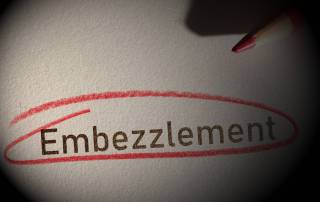What Do New York Embezzlement Laws Say?
Embezzlement, also known as larceny by embezzlement, is the crime of misusing or misappropriating funds over which the offender has some control. Embezzlement charges focus on the fact that the defendant was responsible for taking care of cash or other assets and had no ownership but used the property illegally for their own benefit.
Embezzlement is a white-collar crime, and many statutes punish the crime, with the most frequently used being 18 U.S.C. § 641. The penalties can be stiff depending on the value of the property in question. Contact a skilled Long Island criminal justice attorney for aggressive defense if you’ve been arrested and charged with embezzlement in New York.
What Types of Crime Constitute Embezzlement in New York?
The easiest way to understand larceny by embezzlement is to look at it as unlawfully taking someone’s property to deprive them of it or withholding it. In the context of embezzlement, property refers to money obtained through various means, such as:
- Skimming cash
- Unapproved wire transfers
- Improper use of a credit card
- Obtaining funds through fraudulent checks and manipulated financial documents

The penalties for embezzlement upon a conviction can be severe. Hiring a skilled Long Island white-collar crime defense attorney can enhance your chances of fighting the charges successfully. Criminal defense lawyers know how the system works and can help you navigate the complex matters that could risk your freedom and future.
Levels of Embezzlement
Larceny by embezzlement differs from simply not repaying a debt. The Court of Appeals in New York explains that there must be a clear distinction between failure to pay a valid debt and the crime of embezzlement.
The degree of the severity of the crime depends on the amount of money in question:
- First-degree grand larceny: First-degree grand larceny is the most severe embezzlement crime. It is a Class B felony punishable by up to 25 years in prison if the funds embezzled exceed $1,000,000
- Second-degree grand theft: It is a Class C felony punishable by up to 15 years in prison if the money involved is more than $50,000 but not more than $1,000,000
- Third-degree grand theft: It is a Class D felony punishable by up to seven years in prison if the embezzlement involves more than $3,000 but not more than $50,000
- Fourth-degree grand larceny: The crime is a Class E felony punishable by up to four years in prison if the amount is more than $1,000 but not more than $3,000
A prosecutor may aggregate multiple thefts over extended periods to enhance the degree of the severity of the charges to increase your penalties. An aggressive white-collar crime defense lawyer in Long Island can help you understand the gravity of the charges and help you create a strong defense strategy to protect your rights.
Embezzlement Related Offenses
Depending on the circumstances surrounding your case, you may also face other charges closely related to larceny by embezzlement:
Possessing Stolen Property
New York also recognizes another type of embezzlement in the form of possession of stolen property, in this case, money. The crime will be aggregated even if you don’t have the money in your account or have perpetrated the offense over a few years.

For example, if you have six counts of stealing $10,000, the offense won’t be classified as six Class D felonies but one Class C felony involving more than $50,000. Additionally, the court may impose six counts of forgery and falsifying business records in the first degree under classes D and E, respectively.
You don’t need to have the money physically to be prosecuted. The amount is aggregated over the time you embezzled the funds.
Falsifying Business Records
Falsifying business records can be part of embezzlement charges in New York. The offense happens when you alter business records or delete records and is charged in the first degree. You could also face charges for the crime if you fail to make entries in financial records with the intent to embezzle funds.
If the act is to conceal theft, you could be charged with a first-degree Class E felony. The crime is punishable by one to four years in prison for each count of falsified business records.
Possession of a Forged Instrument
The crime is similar to forgery, but the offense is being in possession of a manipulated document. It is a Class D felony charged in the second degree.
Offering a False Instrument for Filing
Offering a false instrument for filing with the intent to defraud a public office is another crime under larceny with embezzlement. The law classifies it as a first-degree offense under Class E Felonies.

All these crimes related to embezzlement are felonies, not misdemeanors. You risk imprisonment in state prison for more than one year if convicted. You need to fight to protect your rights and reduce the chances of incarceration. Aggressive white-collar crime lawyers in Long Island can come to your defense.
An Aggressive Criminal Defense Lawyer Defending You Against Embezzlement Charges
If you face embezzlement charges in New York, you risk hefty penalties, including incarceration. Understanding how embezzlement law works is vital to help you prepare your defense. Skilled criminal defense lawyers in Long Island can answer all your questions and help you navigate the complex justice system to protect your future.
The Mirsky Law Firm hosts successful white-collar crime defense attorneys who can represent you against arrests and indictments for embezzlement and other crimes. We can assess the evidence against you and help you create a plan of action to challenge the accusations while fighting for the most favorable outcome. Call us at 516-744-1811 to schedule a consultation.















